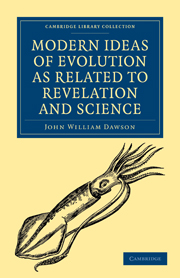Book contents
- Frontmatter
- PREFACE
- Contents
- CHAPTER I PRESENT ASPECTS OF THE QUESTION
- CHAPTER II WHAT IS EVOLUTION?
- CHAPTER III THE ORIGIN OF LIFE
- CHAPTER IV THE APPARITION OF SPECIES IN GEOLOGICAL TIME
- CHAPTER V MONISTIC EVOLUTION
- CHAPTER VI AGNOSTIC EVOLUTION
- CHAPTER VII THEISTIC EVOLUTION
- CHAPTER VIII GOD IN NATURE
- CHAPTER IX MAN IN NATURE
- CHAPTER X GENERAL CONCLUSIONS
- APPENDIX I WEISMANN ON HEREDITY
- APPENDIX II DR. McCOSH ON EVOLUTION
CHAPTER V - MONISTIC EVOLUTION
Published online by Cambridge University Press: 29 August 2010
- Frontmatter
- PREFACE
- Contents
- CHAPTER I PRESENT ASPECTS OF THE QUESTION
- CHAPTER II WHAT IS EVOLUTION?
- CHAPTER III THE ORIGIN OF LIFE
- CHAPTER IV THE APPARITION OF SPECIES IN GEOLOGICAL TIME
- CHAPTER V MONISTIC EVOLUTION
- CHAPTER VI AGNOSTIC EVOLUTION
- CHAPTER VII THEISTIC EVOLUTION
- CHAPTER VIII GOD IN NATURE
- CHAPTER IX MAN IN NATURE
- CHAPTER X GENERAL CONCLUSIONS
- APPENDIX I WEISMANN ON HEREDITY
- APPENDIX II DR. McCOSH ON EVOLUTION
Summary
We have already seen that modern evolution in some of its phases is not inconsistent with theism, or even with Christian belief. It is indeed regarded by some of its advocates as a reverent recognition of, the mode of development of the plans of Eternal Wisdom, and as capable of throwing light on these plans in the domain of the spiritual as well as in that of the natural. But many of its most ardent advocates, whether scientific or popular, go far beyond the bounds of theism, and enter on atheistic or agnostic speculations, which they regard as the logical and legitimate outcome of the hypothesis of evolution. Perhaps the most eminent advocate of this extreme school is Ernst Haeckel, of Jena, whose views have been presented to the world in his works on The History of Creation and The Evolution of Man, as well as in many addresses and papers. They may be taken as the best presentation of monistic, that is, atheistic and materialistic, evolution.
Haeckel is an eminent comparative anatomist and physiologist, who has earned a wide and deserved reputation by his able and laborious studies of the calcareous sponges, the radiolarians, and other low forms of life. In his work on The Evolution of Man, he applies this knowledge to the solution of the problem of the origin of humanity, and sets himself not only to illustrate but to ‘prove’ the descent of our species from the simplest animal types, and even to overwhelm with scorn every other explanation of the appearance of man, except that of spontaneous evolution.
- Type
- Chapter
- Information
- Modern Ideas of Evolution as Related to Revelation and Science , pp. 118 - 150Publisher: Cambridge University PressPrint publication year: 2009First published in: 1890

